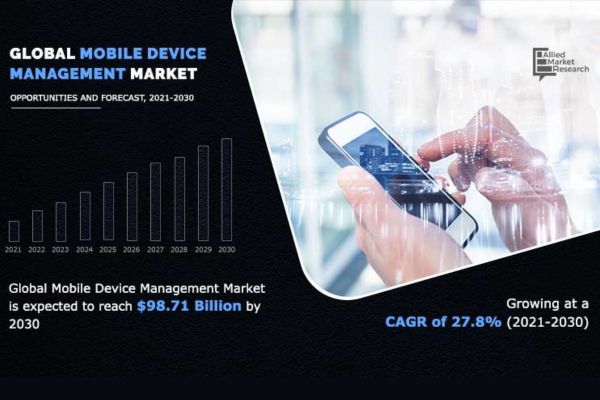Mobile device management is technology that enables businesses to control and protect mobile devices like smartphones, tablets and laptops. This permits management to control and remotely manage a device, guarantee security, and avoid data loss.
The mobile device management sector is witnessing significant growth because of the growing adoption of mobile-related software in most industries like BFSI, IT, and telecommunications. Mobile application management, mobile security management, and enterprise mobility management are being deployed to ensure the secure retrieval and storage of information. Leading manufacturers such as ManageEngine offer comprehensive solutions for managing mobiles and securing corporate data. Similarly, IBM Corporation focuses on BYOD (Bring Your Own Device) security, along with identity and access management.
The sector is further fueled by the growth of BYOD, owing to the fact that organizations are increasingly giving their employees permission to access work with their personal devices. This approach presents opportunities and challenges in securing corporate networks. However, the widespread adoption of BYOD is anticipated to continue growing, particularly in industries with a high number of remote workers, which include healthcare, government, and the retail sector. Companies are able to gain an advantage from improved productiveness and decreased hardware expenses by adopting a BYOD policy.
As per market analysis, the global mobile device management market is predicted to showcase a remarkable CAGR of 27.8% during the forecast timeframe.
Latest advancements in mobile device management (MDM)
There are several notable developments in mobile device management that promote control and security for business mobile devices, consisting of phones, tablets, and laptops. Some key improvements include cloud-based MDM and AI-powered threat detection.
Cloud-based MDM
Earlier, companies had to install MDM software on their own servers, which was costly and complex. Now, cloud-based MDM allows businesses to manage all devices online. IT teams can install apps, as well as upgrade software, and are able to set remote security policies. If a device is lost, they can lock it or remove the data. Cloud MDM is flexible, which means businesses are able to add or remove devices without additional hardware. This service updates automatically, keeping security strong. This makes mobile device management more scalable, secure, and cost-effective.
AI-powered threat detection
AI makes MDM smarter by detecting security threats in real time. Traditional MDM systems follow fixed rules, but AI learns from data and spots unusual behavior. For example, if a phone accesses company data from an unknown location, AI can detect it and alert IT teams. It also identifies malicious software and blocks unsafe apps. Artificial intelligence minimizes IT workload by making security decisions automatically. Some systems even use biometric authentication like fingerprints or facial recognition for extra safety. AI-powered MDM protects businesses from cyber threats and keeps employee devices secure.
Key initiatives by industry leaders to enhance mobile device management industry
Several recent initiatives have been launched to address challenges in the mobile device management sphere and enhance its global accessibility. Leading corporations are adopting cutting-edge strategies to maintain the growth of the evolving industry. For example, in January 2023, Google Cloud introduced new security agreements intended to provide exceptional choice, capacity, and simplicity to public and commercial sector IT teams that manage large-scale hybrid operations.
Also again, in January 2023, Ivanti and Lookout, Inc. strengthened their partnership to improve mobile security. They are utilizing Lookout Mobile Endpoint Security to lower mobile risks and support faster cloud adoption with secure cloud applications.
Nevertheless, in July 2023, Samsung teamed up with Microsoft and launched the first on-device, hardware-based mobile device attestation solution that works consistently on personal and corporate devices. This hardware-driven attestation solution is available on Samsung Galaxy1 smartphones and is built with security features from Microsoft Intune.
In closing, the mobile device management industry is experiencing considerable expansion since businesses adopt mobile technologies. The rise of cloud-based MDM and AI-powered security solutions is making it easier and safer for companies to manage devices. Moreover, the growth in remote work and BYOD policies, along with the increasing demand for MDM solutions, is expected to drive further expansion, offering new opportunities in security and scalability.

















